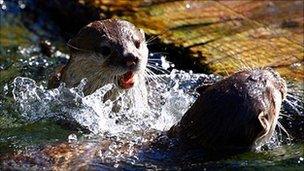Otters return to 'healthy' rivers around Wales
- Published

Otter populations took decades to recover from toxic pesticides used in the 1950s
The otter population is booming in Wales, according to the latest survey.
Environment Agency Wales said there are signs the fish-eating mammals are now living in 1,000 sites around the country.
Its findings reveal nine out of every 10 sites surveyed had signs of the animals, compared to just two in 10 in 1978.
Biodiversity officer Rob Strachan said: "Our rivers are the healthiest they've been for 20 years."
The agency carries out a survey to show trends in the otter population every seven years. This is the latest study since 2002.
The agency traced otters to around 1,000 sites in Wales via their droppings - known as spraints - and their distinctive five-toed footprints.
Mr Strachan said: "The otter is an important biological indicator of the health of our rivers and wetlands.
"Monitoring its status gives us a valuable measure of how well our water environment is faring.
"Such an increase in otter distribution represents a significant increase in the number of otters on the rivers and wetlands of Wales."
The research also showed the otter population in Anglesey has expanded rapidly since 2002.
Otters are living at 67% of sites, including new ones in the west and north of the island, compared to just 18% in 2002.
Environment Agency Wales said the rise in numbers is is particularly good news after the otter population was almost decimated due to the use of harmful pesticides in the 1950s.
The chemicals were banned, but it has taken a long time for numbers to recover.
Now, thanks to the introduction of legal protection for the otter and a vast improvement in water quality, numbers are steadily increasing once more.
"Our rivers are the healthiest they've been for 20 years but we continue to monitor them and to deliver further improvements under the water framework directive, external" said Mr Strachan.
"Challenges lie ahead in maintaining this good work but our survey shows a major success story for pollution control, as well as investment by the water industry and efforts by landowners and river managers.
"We must continue to work together to ensure the otter remains the emblem of a healthy water environment."
- Published18 August 2010